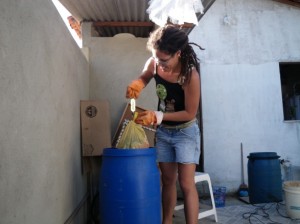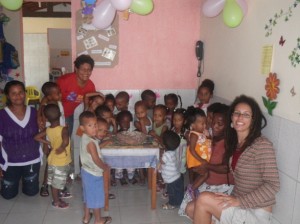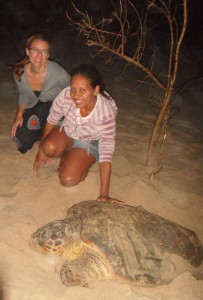 As the jumpy, beat-up bus lifted a cloud of dust behind it, I felt a lump in my throat. I stuck my head out the window and took in the scenery: palm trees, mangroves, birds and sunshine. I was leaving the small rural town of Mutá in Bahia, Brazil, for the last time. Nine months had passed and Mutá had started to feel like home.
As the jumpy, beat-up bus lifted a cloud of dust behind it, I felt a lump in my throat. I stuck my head out the window and took in the scenery: palm trees, mangroves, birds and sunshine. I was leaving the small rural town of Mutá in Bahia, Brazil, for the last time. Nine months had passed and Mutá had started to feel like home.
When I first arrived, my intention was to help the town reuse all its organic waste. My Fulbright project consisted of building a biogas system to produce cooking gas, supplemented by composting, while raising awareness about adequate solid waste disposal methods. After a few months of investigating the possibility of a replicable biogas system (as an alternative energy method for rural communities), I realized that my Fulbright experience was about more than just my research. I quickly became involved with the Mutá Residents’ Association and its nursery. Each day, I visited the kids, helped with lunch, read stories and relished the company of these wonderful children who, in spite of not having luxuries of any kind, giggled, smiled and played with me.
 Living in this community gave me an opportunity to become part of something bigger than my Fulbright project. During most evenings, I attended Association reunions, church activities, birthday parties and other events that allowed me to discuss customs back home, food differences and national and international stereotypes. As I overcame language barriers, the challenges I initially faced in adapting to living in a poor fishing community diminished considerably. By offering English lessons, I became friends with the older children I mentored and tutored. I also performed tutorials for the community on composting and biogas as alternative ways to dispose of organic waste. All of these regular interactions helped me recognize how the degree of a community’s social inclusion’s impacts environmental issues, and how it affects rural communities throughout Bahia. My Fulbright experience expanded my understanding of underrepresented social groups with limited access to traditional education, and developed my ability to transcend cultural differences to attain a common goal. Collaborating with some amazing people, I was able to design and construct a biogas system, a composting area and a small garden in the nursery.
Living in this community gave me an opportunity to become part of something bigger than my Fulbright project. During most evenings, I attended Association reunions, church activities, birthday parties and other events that allowed me to discuss customs back home, food differences and national and international stereotypes. As I overcame language barriers, the challenges I initially faced in adapting to living in a poor fishing community diminished considerably. By offering English lessons, I became friends with the older children I mentored and tutored. I also performed tutorials for the community on composting and biogas as alternative ways to dispose of organic waste. All of these regular interactions helped me recognize how the degree of a community’s social inclusion’s impacts environmental issues, and how it affects rural communities throughout Bahia. My Fulbright experience expanded my understanding of underrepresented social groups with limited access to traditional education, and developed my ability to transcend cultural differences to attain a common goal. Collaborating with some amazing people, I was able to design and construct a biogas system, a composting area and a small garden in the nursery.
Previous to these wonderful experiences in Mutá, I had worked hard on my Fulbright application. I spent six months reading dozens of articles, investigating related projects in Brazil, sharing my project proposal and personal statement with friends and colleagues and obtaining affiliations. I urge current applicants to do the same. In developing a proposal, demonstrate that your proposed project will fulfill a very palpable need that will directly benefit your host community. Furthermore, in finding an affiliation, patience and perseverance are crucial. Potential host affiliations need to be contacted well in advance of the application deadline. Keep in mind that contacting more than one affiliation can be advantageous, particularly if your first choice doesn’t work out. The success of your project can depend on the number of people who are interested in it. Also, while you’re developing your proposal, keep an open mind to changes. This greatly benefits any project. Starting early with these application components gave me time to craft polished documents that I felt confident submitting, and my efforts ultimately paid off.
As a Fulbright alumna, I have benefited from a world of opportunities in academia. I have participated in conferences, presented my findings at universities and met marvelous individuals through non-governmental organizations interested in learning more about my project. My Fulbright grant continues to be much bigger than just the sum of my research; it was, and is, a life-changing experience through which I uncovered my passion for investigating ways to fulfill rural communities’ basic sanitary and energy needs.
On my last day in Mutá, good friends walked me to the bus stop and sent me off with hugs, kisses and nostalgic goodbyes. With barely any academic education, members of this community taught me many important things in only nine months. Through their constant acceptance, incessant curiosity and unmistakable joy, they made me feel right at home. I still keep in touch with many of my friends, and it is rewarding to know that they are currently eating the vegetables we planted together. The most valuable lesson I learned? Not everything is as one expects. Nine months is more than enough time to make a place feel like home.
Top left photo: Cristina Gauthier, 2010-2011, Brazil, weighing organic waste
Middle photo: Cristina Gauthier, 2010-2011, Brazil (right), attending a birthday party for one of the children at the Mutá Residents’ Association’s nursery




 On September 2, 2009, I arrived in
On September 2, 2009, I arrived in